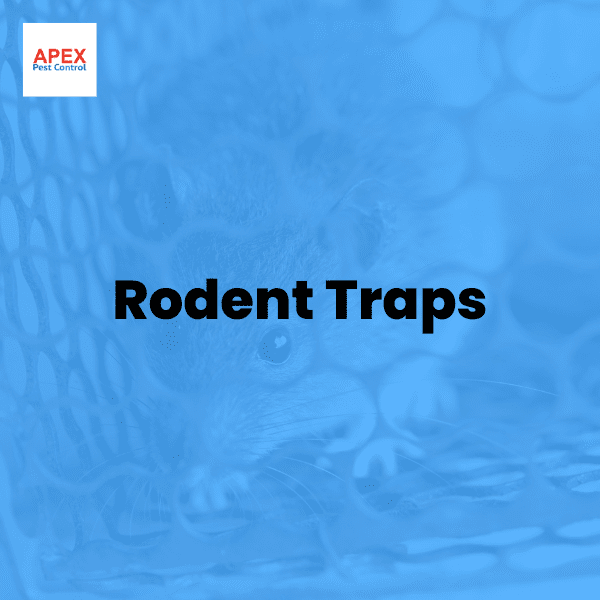Effective Rodent Traps: The Critical Guide to Stop Mice
At Apex Pest Control, we understand the challenges of dealing with rodent infestations in South Yorkshire. Our expertise in pest management allows us to provide you with the most effective solutions for rodent control. In this comprehensive guide, we’ll explore various types of rodent traps, their effectiveness, and how to use them safely and humanely.
Types of Rodent Traps
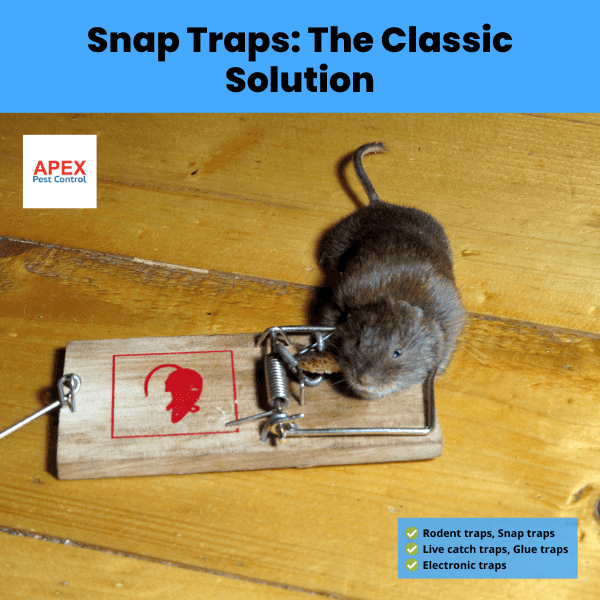
Snap Traps: The Classic Solution
Snap traps are a time-tested method for rodent control, popular in homes across Sheffield, Barnsley, and Rotherham.
How They Work
A snap trap uses a spring-loaded bar that swiftly comes down upon the rodent when triggered. The trigger is typically a plate or lever connected to the bait.
Pros and Cons
- Pros:
- Simple and cost-effective
- Efficient when properly set
- Reusable
- Cons:
- Potential for injury if mishandled
- May cause discomfort to the rodent if not instantly effective
- Disposal of the rodent can be unpleasant
Live Catch Traps: The Humane Option

For those in South Yorkshire looking for a more compassionate approach to pest control, live catch traps offer an ethical alternative.
How They Work
These traps are designed with doors or entrances that close once the rodent enters for food to be placed inside as bait.
Pros and Cons
- Pros:
- A humane method that doesn’t harm rodents
- Allows for relocation of captured animals
- Suitable for those with ethical concerns
- Cons:
- Requires frequent checking to prevent stress to captured animals
- Relocation may not always be feasible or legal in some areas of the UK
- Less effective for large infestations
Glue Traps: A Controversial Choice
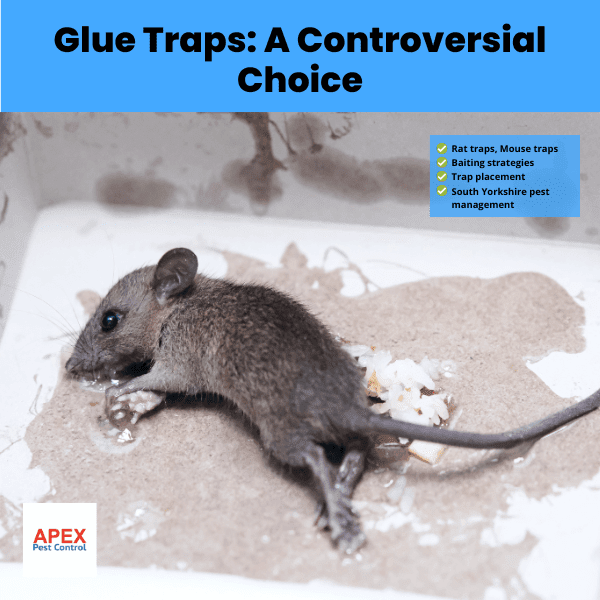
While effective, glue traps are often debated due to animal welfare concerns.
How They Work
This type utilises strong adhesive applied on flat boards where bait is also positioned.
Pros and Cons
- Pros:
- Easy to set up and use
- Effective in capturing rodents
- Cons:
- Considered inhumane by many due to prolonged suffering of trapped rodents
- Can potentially catch non-target animals
- Disposal can be challenging and unpleasant
Electronic Traps: The Modern Solution
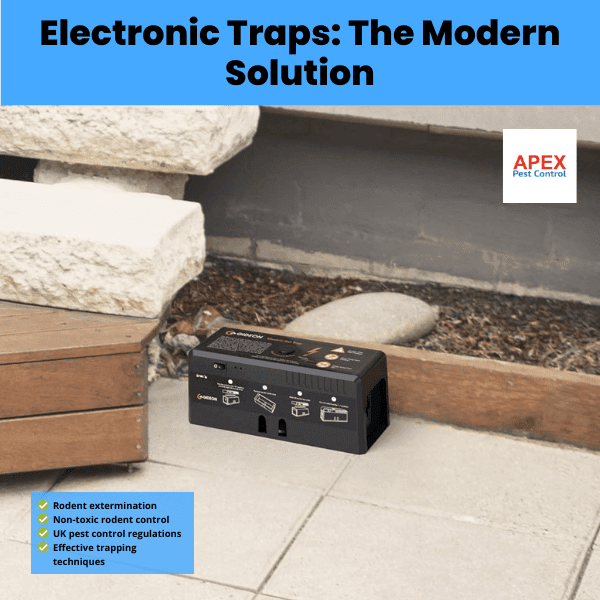
For those in South Yorkshire seeking a high-tech approach to rodent control, electronic traps offer an innovative solution.
How They Work
With electronic versions, mice enter a chamber housing metal plates charged by batteries which emit electric shocks leading to immediate extermination.
Pros and Cons
- Pros:
- Quick and effective method
- No physical contact required during disposal
- Often come with indicator lights for successful catches
- Cons:
- Higher cost compared to traditional traps
- Dependent on batteries or electricity
- May not be suitable for outdoor use in UK weather conditions
Factors To Consider When Choosing A Rodent Trap
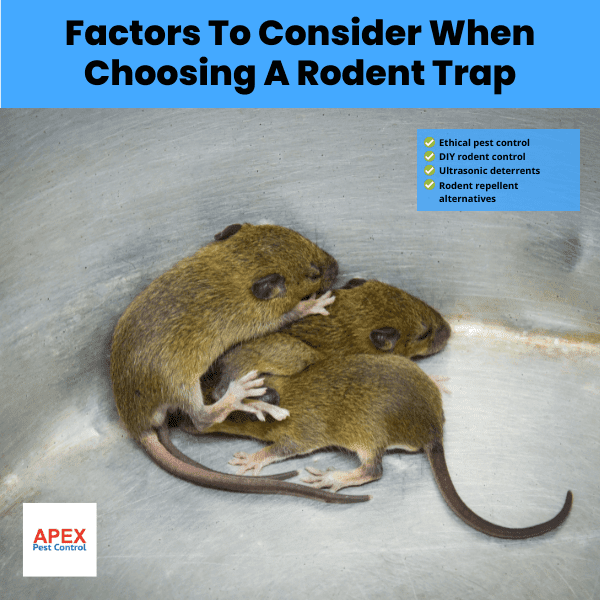
Type Of Rodent
Different rodents require different approaches. For instance, rats in Rotherham might be more cautious than mice in Sheffield, affecting trap choice and placement.
Size Of Infestation
For larger infestations in South Yorkshire homes or businesses, consider traps that can handle multiple catches or have greater capacity.
Location Of Infestation
The area of infestation in your UK property will influence trap selection. Hidden areas might require compact designs, while open spaces allow for larger traps.
Safety Concerns
If you have children or pets in your South Yorkshire home, prioritise traps that minimise risks to non-target individuals.
Proper Placement of Rodent Traps
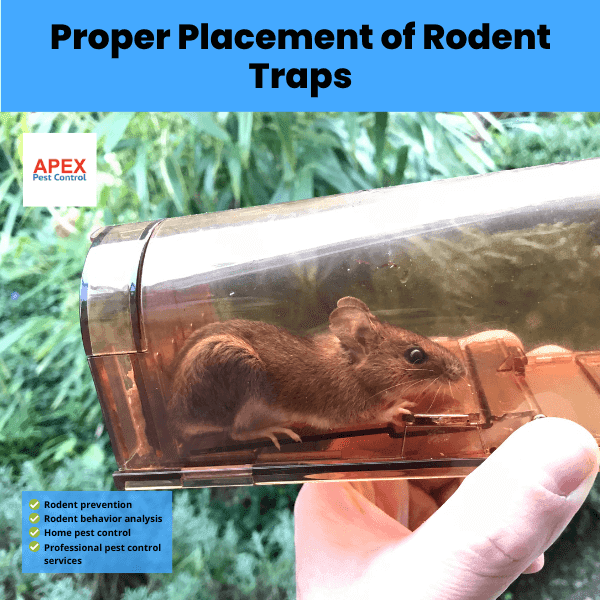
Identifying Rodent Activity
Look for signs such as droppings or chew marks to identify hotspots of rodent activity in your UK property.
Best Places To Set Traps
Place traps along walls where rodents tend to travel due to their poor eyesight. This is particularly effective in older buildings common in Sheffield and Barnsley.
Number Of Traps Needed
For effective results in South Yorkshire properties, place several traps at various points to increase capture chances, especially for larger populations.
Effective Baiting Techniques
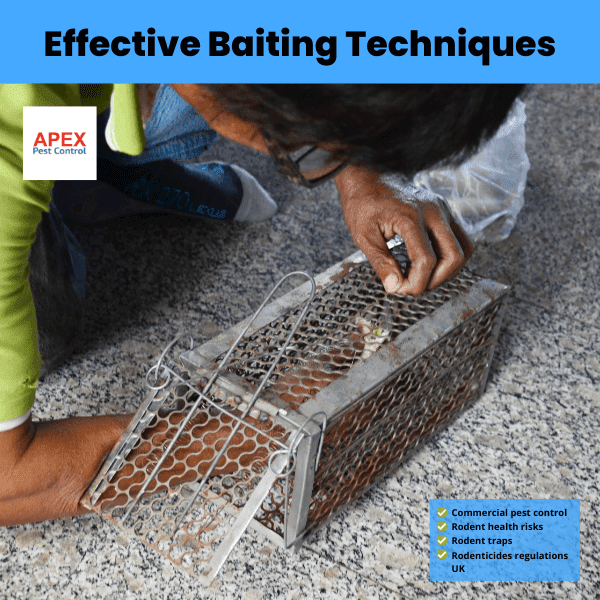
Types Of Bait
Strong-smelling foods like cheese and peanut butter are effective in attracting UK rodents. In cases of insect-infested homes, using nesting materials like cotton balls can be more effective.
How To Apply Bait
Remember, less is more when baiting. Apply just enough to make rodents interact with triggers but not in excess amounts that allow stealing without setting off the trap.
Bait Placement
Position baits strategically onto trigger mechanisms rather than just anywhere within traps for maximum effectiveness.
Safety Measures When Handling Rodent Traps
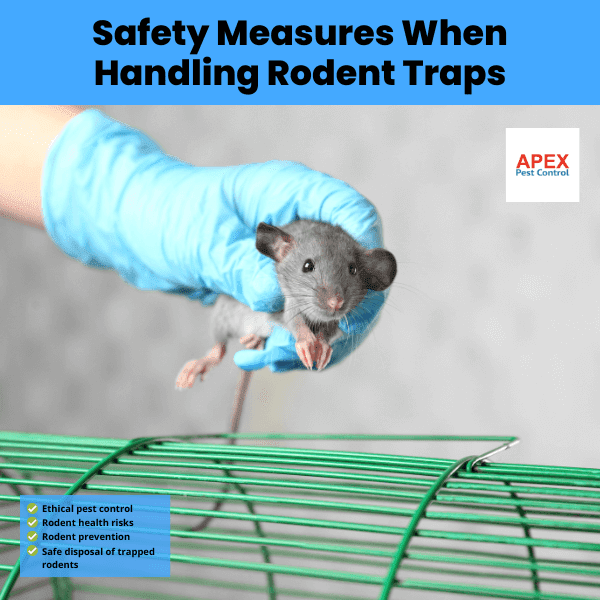
Using Gloves
Always use gloves to protect yourself from possible diseases and to prevent human scent transfer, which may deter rodents from approaching traps.
Disposal Of Trapped Rodents
Dispose of caught specimens in sealed bags, then place them in covered bins outside your South Yorkshire home. Always wash your hands thoroughly afterwards.
Cleaning And Disinfection
After every catch, ensure thorough cleaning using a mixture of water and bleach (1 part bleach to 10 parts water) to kill any lingering germs.
Alternatives To Rodent Traps

Rodenticides
While effective, these poisons must be used cautiously due to their high toxicity levels towards non-target creatures, including pets and humans. Always follow UK regulations when using rodenticides.
Ultrasonic Repellents
These devices emit high-frequency sounds disliked by rodents, potentially forcing them out of UK homes. However, they may not be effective for heavy infestations.
Professional Pest Control Services
At Apex Pest Control, we offer advanced techniques and safe chemicals to ensure complete eradication of rodents from South Yorkshire homes and businesses.
Ethical Considerations In Rodent Control
Humane Treatment
Opting for live traps reflects ethical concerns about treating even pests humanely, a growing concern among UK residents.
Environmental Impact
Avoid methods that may harm non-target species or contaminate the UK environment, such as certain rodenticides when improperly handled or disposed of.
The Science Behind Effective Rodent Traps
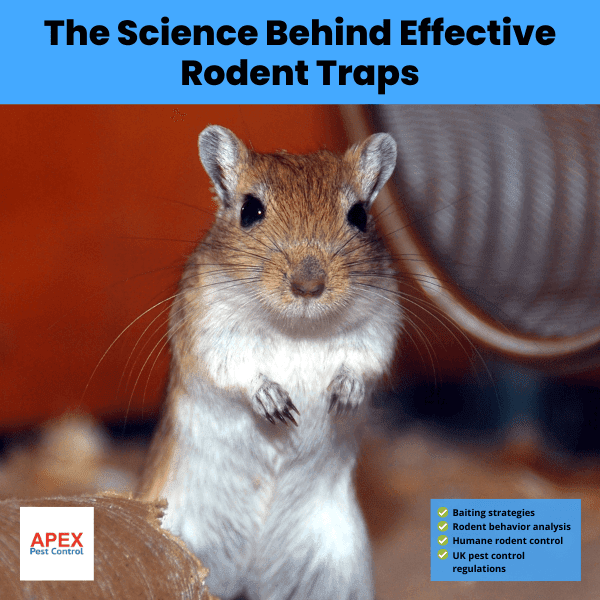
Understanding the science behind rodent traps can significantly improve their effectiveness. Rodents, being small mammals with keen senses, are attracted to various types of traps. Their adaptability and neophobic tendencies make selecting the right trap critical for success.
Rodent Behavior and Biology
Rodents’ prolific breeding habits make swift action crucial when dealing with infestations in South Yorkshire. Their gnawing behaviours can cause significant damage to property and food supplies, making effective trapping essential.
Mechanisms of Snap Traps
Snap traps utilise a spring-loaded mechanism to swiftly capture rodents. The spring stores potential energy, released when the trap is triggered. These traps are designed with highly sensitive trigger mechanisms, ensuring effective capture when a rodent interacts with it.
| Snap Traps | Spring-Loaded Mechanism | Humane |
|---|---|---|
| Utilize springs | Store potential energy | Effective |
| Sensitive triggers | Swiftly capture rodents | Efficient |
| Considered humane | Deliver quick death | Rodent control |
Live Capture Trap Functionality
Live capture traps provide a humane method for capturing rodents alive without causing harm. These traps are designed to trap rodents safely, allowing for their release back into the wild or relocation to a more suitable environment.
Strategic Trap Placement
For maximum effectiveness, strategic placement of traps is essential. Identifying high-traffic rodent areas in your South Yorkshire property and placing traps along walls and near entry points greatly increases the chances of trapping rodents.
Mimicking Natural Rodent Behaviours
Understanding how rodents move, feed, and nest can greatly influence the success of your trapping efforts. Traps that mimic natural rodent behaviours, such as exploring, foraging, and seeking shelter, are more likely to be effective.
Summary Of Key Points
- Recap Of Rodent Trap Types: Four main types exist: snap, electronic, glue, and live catch – each with its own pros and cons.
- Recap Of Choosing, Placing And Baiting Traps: Your choice depends on the type of rodent present, size/location of infestation, and safety aspects. Place traps in areas showing signs of activity and use appealing baits applied strategically.
- Recap Of Safety Measures And Alternatives: Use gloves during handling and clean/disinfect after every disposal. Consider alternatives such as professional services or repellents if trapping fails.
- Recap Of Ethical Considerations: Remember humane treatment principles and protect the UK environment through responsible pest control methods.
Frequently Asked Questions
What is the most effective type of rodent trap for UK homes?
The most effective type of rodent trap depends on your specific situation in South Yorkshire. Snap traps are generally considered highly effective for quick results, while live capture traps offer a humane alternative. Electronic traps provide a balance of effectiveness and ease of use. The key to success is proper placement and baiting, regardless of the trap type chosen.
Are glue traps humane for catching rodents?
Glue traps are considered less humane than other trapping methods because they can cause prolonged suffering to the trapped animal. Many animal welfare organisations in the UK discourage their use. If you’re concerned about humane pest control, consider live capture traps or instant-kill snap traps instead.
How often should I check and reset rodent traps in my South Yorkshire home?
It’s recommended to check traps at least once daily, preferably in the morning. This ensures that any captured rodents are dealt with promptly and humanely. Reset and rebait traps as needed, typically every few days or when the bait is consumed or loses freshness.
What’s the best bait to use in rodent traps in the UK?
Effective baits include peanut butter, chocolate, bacon, nuts, and seeds. Peanut butter is particularly popular due to its strong scent and sticky consistency, which makes it difficult for rodents to remove without triggering the trap. Experiment with different baits to see what works best for your specific rodent problem in South Yorkshire.
Can I reuse rodent traps, or should I dispose of them after each use?
Many rodent traps, especially snap traps and live capture traps, can be reused multiple times. After each use, clean and disinfect the trap thoroughly before reusing. However, if a trap becomes damaged or heavily soiled, it’s best to replace it. Single-use traps, such as some glue traps, should be disposed of after one use.
How do electronic rodent traps work, and are they safe to use in UK homes?
Electronic rodent traps work by delivering a high-voltage shock to the rodent when it enters the trap, resulting in a quick death. They are generally safe to use in UK homes when used according to the manufacturer’s instructions. However, they should be placed out of the reach of children and pets.
What are the legal considerations for rodent control in the UK?**
In the UK, it’s legal to control rodents on your property, but there are regulations regarding the use of certain methods. For example, the use of some rodenticides is restricted to professional pest controllers. It’s always best to consult with a professional pest control service like Apex Pest Control for the most up-to-date and legally compliant methods.
How can I prevent rodents from entering my South Yorkshire home in the first place?**
Prevention is key to rodent control. Seal any potential entry points around your home, keep food in sealed containers, maintain a clean environment, and remove potential nesting sites like piles of wood or debris. Regular inspections and maintenance can help keep your South Yorkshire property rodent-free.
Remember, at Apex Pest Control, we’re here to help with all your rodent control needs in South Yorkshire. Our professional team can provide expert advice and effective solutions tailored to your specific situation.

Tony Johnson, Founder & Lead Technician at Apex Pest Control, is a BPCA and NPTA accredited pest management expert with over 35 years’ hands-on experience. Tony specialises in Integrated Pest Management and ensures all services comply with UK pest legislation, including the Wildlife and Countryside Act 1981 and COSHH Regulations 2002. His commitment to continual learning and adapting to industry best practices means clients receive effective, safe solutions for pests affecting homes and businesses across South Yorkshire. Tony’s dedication to professional standards, ethical treatment methods, and local expertise has made him a trusted partner for pest control and prevention.
-
BPCA & NPTA accredited | CHAS certified
-
Committed to UK pest law compliance & safety
-
Focused on effective, ethical pest management for South Yorkshire

